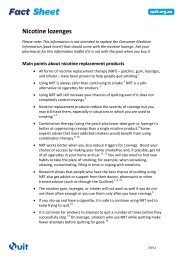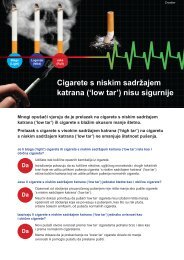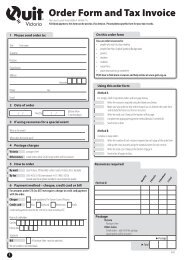Nicotine gum - Quit Victoria
Nicotine gum - Quit Victoria
Nicotine gum - Quit Victoria
Create successful ePaper yourself
Turn your PDF publications into a flip-book with our unique Google optimized e-Paper software.
How well does the <strong>gum</strong> work?<br />
3<br />
People who use the nicotine <strong>gum</strong> are about one and a half times more likely to quit<br />
and stay stopped. 1 <strong>Nicotine</strong> <strong>gum</strong> (4 mg) also appears to delay the weight gain which<br />
may occur after quitting, but doesn’t have a lasting effect beyond its use. 13<br />
When using the <strong>gum</strong> you take in less nicotine at a much slower rate than when<br />
3, 21, 22, 24<br />
smoking. This makes it less addictive and easier to stop using than cigarettes.<br />
However, it will be several minutes slower at easing cravings than a cigarette. Within<br />
seconds of puffing on a cigarette, high levels of nicotine reach your brain. 2 In<br />
contrast, the level of nicotine in your blood will peak within 35 to 40 minutes from<br />
when you start chewing the <strong>gum</strong>. 20 Over a day, <strong>gum</strong> users typically absorb about<br />
one-third (2mg <strong>gum</strong>) or two-thirds (4 mg <strong>gum</strong>) of the dose of nicotine that they<br />
would get from smoking a pack of cigarettes per day. 20<br />
Which strength of <strong>gum</strong> should I use?<br />
Your pharmacist or doctor can advise you what strength of <strong>gum</strong> is suitable for you. If<br />
you smoke less than 20 cigarettes per day, the product information recommends the<br />
2 mg <strong>gum</strong>. The 4 mg <strong>gum</strong> is recommended if you smoke over 20 cigarettes per day,<br />
or if you have not been able to quit using 2 mg <strong>gum</strong>. 18, 20, 25 Some research suggests<br />
that if you usually smoke within 30 minutes of waking, the 4 mg <strong>gum</strong> may work<br />
better for you than the 2 mg <strong>gum</strong>. 26<br />
What do I need to tell my pharmacist or doctor?<br />
Before buying the <strong>gum</strong>, you should tell your pharmacist or doctor if you have an<br />
illness, or if you are taking any other medicines (even non-prescription ones). In<br />
some cases, you may need medical supervision or advice, or in other cases nicotine<br />
<strong>gum</strong> may not be suitable. Please check the Consumer Medicine Information (CMI)<br />
that comes with the <strong>gum</strong> for the latest list of common medicines and medical<br />
conditions that may be affected by using the <strong>gum</strong> or stopping smoking.<br />
Illnesses listed in the CMI for which you may need medical advice include: heart<br />
disease, any blood circulation disorder, kidney disease, liver disease, stomach ulcer<br />
or pain, hyperthyroidism, diabetes, and phaeochromocytoma (a tumour of the<br />
18, 20, 25<br />
adrenal gland).<br />
You should not use the <strong>gum</strong> when your mouth or throat is sore. 20<br />
<strong>Nicotine</strong> <strong>gum</strong> may stick to and damage dentures, dental caps or partial bridges. 20, 25 It<br />
can be mixed with <strong>gum</strong> designed to be used by people with dentures. However,<br />
medical guidelines recommend using a different nicotine product instead. 27










